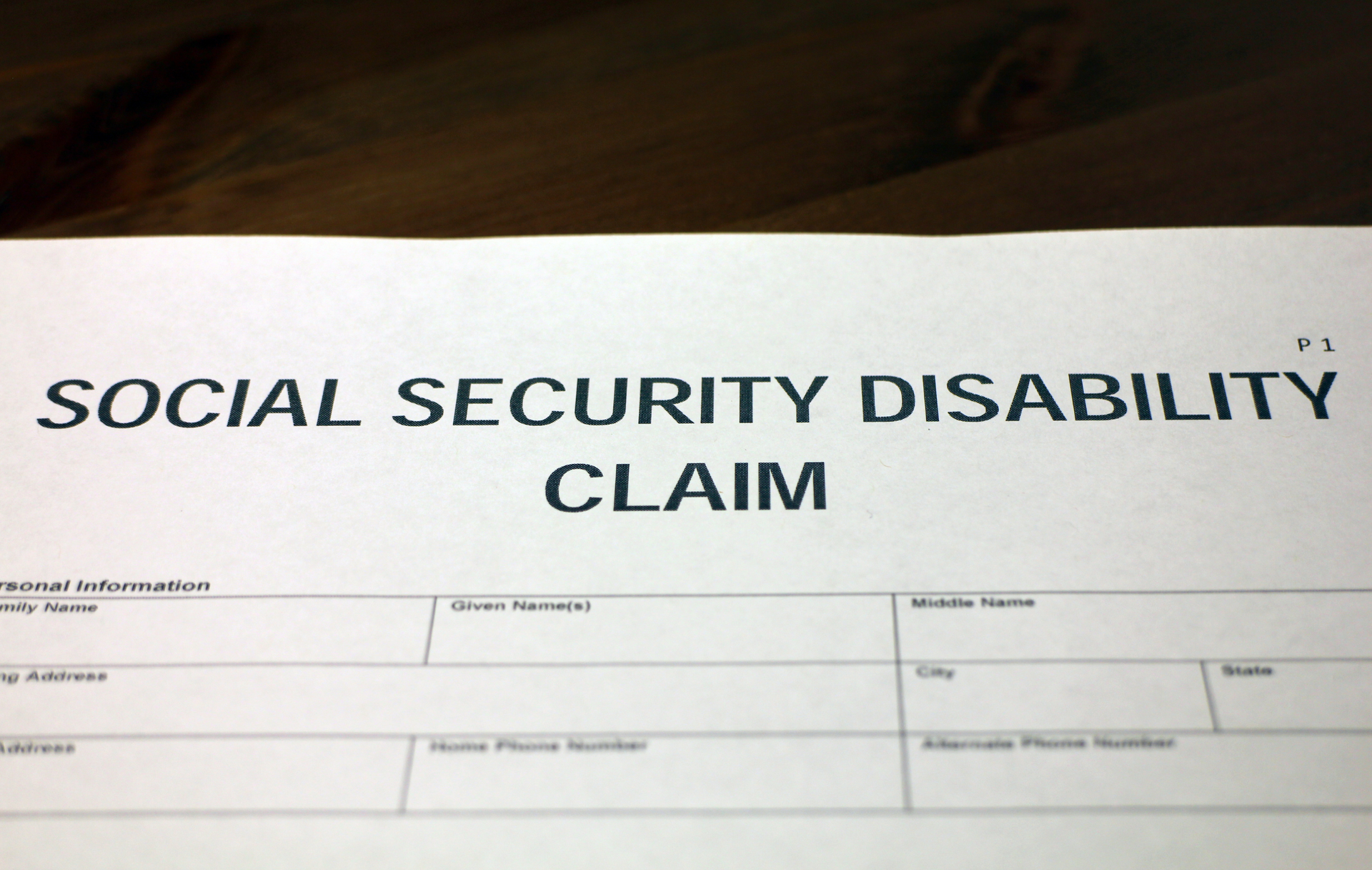Blog

Introduction: Navigating the intricacies of Social Security Disability Insurance (SSDI) eligibility can be challenging, especially when it comes to understanding the role of work history. At Wood & Carlton, P.C., with offices conveniently located in Corinth, Tupelo, and Pontotoc, Mississippi, our knowledgeable attorneys specialize in SSDI claims and can provide valuable insights to help you determine your eligibility. In this comprehensive blog post, we'll explore the impact of work history on SSDI eligibility and offer guidance to individuals seeking disability benefits. The Role of Work History in SSDI Eligibility: Your work history plays a significant role in determining your eligibility for SSDI benefits. The Social Security Administration (SSA) uses a specific formula to assess whether you have worked long enough and recently enough to qualify for disability benefits. Work Credits: SSDI eligibility is based on work credits, which are earned through payment of Social Security taxes on your earnings. To qualify for SSDI benefits, you must have accumulated a sufficient number of work credits based on your age at the time of disability onset. Recent Work Test: In addition to earning enough work credits, you must also meet the recent work test, which evaluates whether you have worked recently enough to be eligible for SSDI benefits. The recent work test considers the number of years you have worked leading up to your disability onset date. Duration of Work: The duration of your work history is another important factor in SSDI eligibility. The SSA considers your total years of work and evaluates whether you have worked long enough to qualify for disability benefits. Generally, individuals with a longer work history are more likely to meet the eligibility requirements for SSDI benefits. Part-Time Work and Self-Employment: Even if you have worked part-time or been self-employed, you may still be eligible for SSDI benefits if you have earned enough work credits and met the recent work test criteria. The SSA evaluates your earnings over a certain period to determine your eligibility based on part-time or self-employment work. Legal Advocacy from Wood & Carlton, P.C.: Navigating the SSDI eligibility requirements related to work history can be complex, but you don't have to navigate this process alone. At Wood & Carlton, P.C., our experienced SSDI attorneys can provide comprehensive legal assistance and guidance to help you understand your eligibility for disability benefits. We can review your work history, assess your eligibility, and advocate for your rights throughout the claims process. Conclusion: Understanding the impact of work history on SSDI eligibility is crucial for individuals seeking disability benefits. With the guidance of experienced attorneys at Wood & Carlton, P.C., you can navigate the SSDI claims process with confidence and increase your chances of securing the benefits you deserve. Contact us today for a consultation to discuss your SSDI claim and learn more about how we can assist you.

Introduction: When it comes to navigating the complexities of the Mississippi workers' compensation system, understanding how pre-existing conditions are handled is crucial. At Wood & Carlton, P.C., with convenient locations in Corinth, Tupelo, and Pontotoc, Mississippi, our experienced attorneys are well-versed in the nuances of workers' compensation law. In this comprehensive blog post, we'll delve into how the Mississippi workers' compensation system addresses pre-existing conditions and provide valuable insights to help you navigate potential challenges. Understanding Pre-Existing Conditions: A pre-existing condition refers to any medical condition or injury that an individual had before their work-related accident or injury occurred. In the context of workers' compensation claims, pre-existing conditions can complicate matters and raise questions about causation, liability, and the extent of benefits owed to the injured worker. How Does the Mississippi Workers' Compensation System Handle Pre-Existing Conditions? Aggravation of Pre-Existing Conditions: In Mississippi, workers' compensation benefits may be available if a work-related accident aggravates or exacerbates a pre-existing condition. If the work-related injury worsens a pre-existing condition or accelerates its progression, the injured worker may be entitled to benefits for the exacerbation. Apportionment of Benefits: Mississippi law allows for the apportionment of workers' compensation benefits when a pre-existing condition contributes to the worker's disability. In such cases, the amount of benefits awarded may be reduced to account for the portion of disability attributable to the pre-existing condition. Proof of Causation: Establishing causation is critical in workers' compensation claims involving pre-existing conditions. The injured worker must demonstrate that their work-related accident or injury was a substantial contributing factor to their current condition or disability, regardless of any pre-existing conditions. Independent Medical Examinations (IMEs): In cases involving pre-existing conditions, employers and insurance companies may request an independent medical examination (IME) to assess the extent of the pre-existing condition and its relationship to the work-related injury. IMEs play a crucial role in determining eligibility for workers' compensation benefits. Legal Advocacy: Navigating workers' compensation claims involving pre-existing conditions can be complex and challenging. Having experienced legal representation from Wood & Carlton, P.C. can make all the difference. Our attorneys have a deep understanding of Mississippi workers' compensation law and can effectively advocate for your rights and interests throughout the claims process. Why Choose Wood & Carlton, P.C.? Experience: With decades of combined experience, our attorneys have a proven track record of success in handling workers' compensation claims, including those involving pre-existing conditions. Personalized Service: At Wood & Carlton, P.C., we prioritize personalized attention and communication. We understand that every case is unique, and we work closely with our clients to develop tailored legal strategies that meet their specific needs and goals. Local Representation: With offices conveniently located in Corinth, Tupelo, and Pontotoc, Mississippi, we are proud to serve the local community and provide accessible legal representation to injured workers throughout the state. Conclusion: Navigating workers' compensation claims involving pre-existing conditions requires a thorough understanding of Mississippi workers' compensation law and diligent legal advocacy. With the experienced attorneys at Wood & Carlton, P.C. by your side, you can trust that your rights will be protected, and your best interests will be served. Contact us today for a consultation to discuss your workers' compensation claim and learn more about how we can assist you.

Navigating the Social Security Disability Insurance (SSDI) claims process can be daunting, especially for individuals with severe medical conditions that significantly impact their ability to work. However, the Compassionate Allowance (CAL) program offers a streamlined path for expedited approval of SSDI claims for individuals with certain qualifying conditions. At Wood & Carlton, P.C., with offices in Corinth, Tupelo, and Pontotoc, Mississippi, our experienced attorneys are well-versed in the CAL program and can provide invaluable guidance to individuals seeking expedited SSDI benefits. In this blog post, we'll explore the Compassionate Allowance program and offer insights to help you understand its benefits and eligibility criteria. What is the Compassionate Allowance (CAL) Program? The Compassionate Allowance (CAL) program is a special initiative established by the Social Security Administration (SSA) to expedite the processing of SSDI claims for applicants with severe medical conditions that meet certain criteria. The CAL program aims to quickly identify and approve claims for individuals whose medical conditions are so severe that they clearly meet the SSA's definition of disability. Qualifying Conditions The CAL program includes a list of medical conditions that automatically qualify applicants for expedited consideration of their SSDI claims. These conditions are typically severe, progressive, and debilitating, making it evident that the applicant is unable to engage in substantial gainful activity (SGA) due to their impairment. Examples of qualifying conditions may include certain types of cancer, rare diseases, neurological disorders, and terminal illnesses. Expedited Processing One of the key benefits of the CAL program is expedited processing of SSDI claims. Applicants with qualifying conditions can expect their claims to be reviewed and processed more quickly than standard SSDI claims, reducing the waiting period for approval and providing much-needed financial support during a time of medical crisis. Applying for CAL Benefits To apply for CAL benefits, individuals must submit an SSDI application through the standard application process. During the application process, applicants should indicate if they have a qualifying condition that may qualify them for expedited consideration under the CAL program. The SSA will then review the applicant's medical records and documentation to determine eligibility for CAL benefits. Legal Assistance from Wood & Carlton, P.C. Navigating the SSDI claims process, including the CAL program, can be complex, especially for individuals dealing with severe medical conditions. At Wood & Carlton, P.C., our experienced SSDI attorneys can provide valuable assistance and guidance throughout the application process. We can help applicants gather the necessary medical evidence, complete the application accurately, and advocate for their rights to expedited consideration under the CAL program. Conclusion The Compassionate Allowance (CAL) program offers a lifeline for individuals with severe medical conditions who are in urgent need of SSDI benefits. By understanding the CAL program and seeking legal assistance from Wood & Carlton, P.C., applicants can navigate the SSDI claims process more effectively and expedite the approval of their benefits. Contact us today for a consultation to discuss your SSDI claim and learn more about how we can assist you in securing the benefits you deserve through the CAL program.

Injured workers often encounter significant challenges when dealing with employers and insurance companies during the workers' compensation claims process. At Wood & Carlton, P.C., with offices in Corinth, Tupelo, and Pontotoc, Mississippi, our experienced attorneys are familiar with these challenges and can provide effective strategies to help injured workers overcome them. In this blog post, we'll discuss some common challenges faced by injured workers and offer valuable insights to navigate these obstacles successfully. 1. Delayed or Denied Claims One of the most common challenges faced by injured workers is the delay or denial of their workers' compensation claims by employers or insurance companies. Employers and insurers may dispute the validity of a claim, delay processing, or deny benefits altogether, leaving injured workers without the financial support they need. Strategy: Seek Legal Representation Injured workers should seek legal representation from experienced workers' compensation attorneys like those at Wood & Carlton, P.C. Our attorneys can advocate on behalf of injured workers, gather evidence to support their claims, and challenge denials or delays through appeals and legal proceedings. 2. Inadequate Medical Treatment Injured workers may encounter difficulties in obtaining timely and appropriate medical treatment for their workplace injuries. Employers or insurers may delay or deny authorization for necessary medical care, leaving injured workers with untreated or improperly treated injuries. Strategy: Document Medical Treatment Injured workers should meticulously document all medical treatment received for their workplace injuries, including doctor's appointments, diagnostic tests, medications, and rehabilitation therapy. This documentation can serve as evidence of the extent and severity of their injuries and support their claims for workers' compensation benefits. 3. Retaliation or Discrimination Some injured workers may fear retaliation or discrimination from their employers for filing workers' compensation claims. Employers may threaten termination, demotion, or other adverse actions against employees who assert their rights to workers' compensation benefits. Strategy: Know Your Rights Injured workers should be aware of their rights under workers' compensation laws and protections against retaliation or discrimination. Consulting with an experienced workers' compensation attorney can help injured workers understand their legal rights and options for addressing any unlawful actions by their employers. 4. Insufficient Benefits Even when workers' compensation claims are approved, injured workers may receive insufficient benefits to cover their medical expenses, lost wages, and other financial losses. Benefit calculations may not accurately reflect the full extent of an injured worker's injuries and resulting disabilities. Strategy: Pursue Maximum Benefits Injured workers should work closely with their attorneys to ensure that their workers' compensation benefits accurately reflect the severity and impact of their injuries. Experienced attorneys can negotiate with insurance companies, pursue additional benefits through appeals, and explore other avenues to maximize compensation for injured workers. 5. Complex Legal Procedures Navigating the workers' compensation claims process can be complex, with numerous legal procedures, deadlines, and requirements that injured workers must adhere to. Without proper guidance, injured workers may struggle to navigate the process effectively. Strategy: Legal Guidance and Support Seeking legal guidance from experienced workers' compensation attorneys is essential for injured workers facing complex legal procedures. Attorneys at Wood & Carlton, P.C. can provide comprehensive support and guidance throughout the claims process, ensuring that injured workers understand their rights and obligations and take the necessary steps to protect their interests. Conclusion Injured workers often face numerous challenges when dealing with employers and insurance companies during the workers' compensation claims process. By recognizing these challenges and implementing effective strategies with the assistance of experienced attorneys at Wood & Carlton, P.C., injured workers can navigate the process successfully and secure the benefits they deserve. Contact us today for a consultation to discuss your case and learn more about how we can help you overcome these challenges.

Navigating the Social Security Disability (SSD) claims process involves understanding the intricate Five-Step Sequential Evaluation Process established by the Social Security Administration (SSA). At Wood & Carlton, P.C., with offices in Corinth, Tupelo, and Pontotoc, Mississippi, our experienced attorneys are well-versed in guiding clients through each step of this process to maximize their chances of approval. In this blog post, we'll provide an overview of the Five-Step Sequential Evaluation Process and offer valuable insights to help you navigate your SSD claim effectively. Step 1: Substantial Gainful Activity (SGA) The first step in the sequential evaluation process involves determining whether you are currently engaging in substantial gainful activity (SGA). If your earnings exceed a certain threshold set by the SSA, you may be considered capable of working and ineligible for SSD benefits. Step 2: Severity of Impairment If you are not engaged in SGA, the SSA will evaluate the severity of your impairment(s) to determine if they significantly limit your ability to perform basic work-related activities. Your impairment(s) must meet the criteria outlined in the SSA's Listing of Impairments or be deemed medically equivalent to a listed impairment to proceed to the next step. Step 3: Listing of Impairments At this stage, the SSA compares your impairment(s) to its Listing of Impairments, which outlines specific medical conditions that automatically qualify individuals for SSD benefits if their impairment(s) meet or equal the severity criteria specified in the listings. If your impairment(s) meet or equal a listed impairment, you will be found disabled without further evaluation. Step 4: Residual Functional Capacity (RFC) If your impairment(s) do not meet or equal a listed impairment, the SSA will assess your residual functional capacity (RFC) to determine your ability to perform work-related activities despite your limitations. Your RFC is an assessment of your physical and mental abilities and limitations and will inform the SSA's decision regarding your ability to perform past relevant work. Step 5: Past Relevant Work and Other Work In the final step, the SSA evaluates whether you can perform your past relevant work based on your RFC and vocational factors such as age, education, and work experience. If you cannot perform past relevant work, the SSA considers whether you can adjust to other work that exists in significant numbers in the national economy, considering your RFC, age, education, and work experience. Expert Guidance from Wood & Carlton, P.C. Navigating the Five-Step Sequential Evaluation Process for SSD claims can be complex and overwhelming. By seeking expert guidance from the experienced SSD attorneys at Wood & Carlton, P.C., you can ensure that your claim is meticulously prepared and effectively presented to the SSA. Our attorneys will work tirelessly to gather supporting evidence, prepare you for hearings, and advocate for your rights throughout the claims process. Conclusion Understanding the Five-Step Sequential Evaluation Process is crucial for navigating the SSD claims process successfully. With the assistance of Wood & Carlton, P.C., you can confidently navigate each step of the process and improve your chances of securing the SSD benefits you deserve. Contact us today for a consultation to discuss your SSD claim and learn more about how we can assist you.

In Mississippi, timely reporting of workplace injuries is crucial for protecting your rights and accessing workers' compensation benefits. At Wood & Carlton, P.C., with offices in Corinth, Tupelo, and Pontotoc, Mississippi, our experienced attorneys understand the significance of prompt reporting and can help you navigate the complexities of the workers' compensation system. In this blog post, we'll explore the importance of timely reporting for workplace injuries in Mississippi and provide essential guidance to injured workers. Understanding Mississippi's Reporting Requirements Mississippi law mandates that employees report workplace injuries to their employers within a specific timeframe to be eligible for workers' compensation benefits. Failure to report an injury promptly can jeopardize your ability to obtain benefits and may result in the denial of your claim. Preserving Your Right to Benefits Timely reporting of workplace injuries is essential for preserving your right to workers' compensation benefits. Reporting your injury promptly allows your employer to initiate the claims process promptly, ensuring that you receive timely medical treatment and financial support while you recover from your injury. Ensuring Accurate Documentation Prompt reporting of workplace injuries helps ensure accurate documentation of the incident and its circumstances. Reporting injuries promptly allows employers to document the details of the incident accurately, including the date, time, location, and nature of the injury. Accurate documentation is crucial for establishing the validity of your workers' compensation claim. Avoiding Disputes and Delays Delaying the reporting of a workplace injury can lead to disputes and delays in the claims process. Employers and insurance carriers may question the validity of your claim if there is a delay in reporting, leading to unnecessary challenges and potential denials. Timely reporting helps expedite the claims process and minimizes the risk of disputes. Protecting Your Legal Rights Reporting workplace injuries promptly is not only a requirement under Mississippi law but also essential for protecting your legal rights. Failing to report an injury in a timely manner may limit your ability to seek compensation for medical expenses, lost wages, disability benefits, and other damages associated with your injury. Seeking Legal Guidance If you've been injured in a workplace accident, it's crucial to report the injury to your employer as soon as possible and seek legal guidance from an experienced workers' compensation attorney. At Wood & Carlton, P.C., our knowledgeable attorneys can help you understand your rights, navigate the reporting process, and pursue the benefits you deserve. Conclusion Timely reporting of workplace injuries is essential for protecting your rights and accessing workers' compensation benefits in Mississippi. By reporting injuries promptly and seeking legal guidance from Wood & Carlton, P.C., you can ensure that your rights are preserved, and you receive the benefits you deserve. Contact us today for a consultation to discuss your case and learn more about how we can assist you.

Securing strong medical evidence is crucial for a successful Social Security Disability (SSD) claim. At Wood & Carlton, P.C., with locations in Corinth, Tupelo, and Pontotoc, Mississippi, our experienced attorneys understand the importance of robust medical documentation in supporting your disability claim. In this blog post, we'll share top tips for gathering strong medical evidence to strengthen your SSD claim and improve your chances of approval. 1. Establish a Relationship with Healthcare Providers Building a strong relationship with your healthcare providers is essential. Ensure that your doctors understand the nature and severity of your condition and are willing to document your symptoms, limitations, and treatment plans thoroughly. Regular medical appointments and follow-ups can help maintain continuity of care and strengthen your medical evidence. 2. Document Symptoms and Limitations Keep detailed records of your symptoms, limitations, and how they impact your daily life and ability to work. Maintain a symptom journal where you can track pain levels, mobility issues, cognitive difficulties, and other relevant factors. Providing specific examples and anecdotes can help paint a clear picture of your disability and its impact on your functionality. 3. Follow Treatment Plans Consistently Adherence to prescribed treatment plans demonstrates your commitment to managing your condition and improving your health. Attend all medical appointments, follow medication regimens, participate in therapy or rehabilitation programs, and make lifestyle modifications as recommended by your healthcare providers. Compliance with treatment can strengthen your case by showing that you're actively seeking medical help and trying to improve your condition. 4. Obtain Objective Medical Testing Objective medical testing, such as diagnostic imaging, laboratory tests, and specialist evaluations, can provide concrete evidence of your impairment. Ensure that your healthcare providers conduct appropriate tests to confirm your diagnosis and assess the severity of your condition. Medical reports, test results, and imaging studies can serve as critical pieces of evidence in your SSD claim. 5. Seek Supportive Statements from Healthcare Providers Obtain written statements or opinion letters from your treating physicians that describe your diagnosis, prognosis, treatment history, and functional limitations. These statements should explicitly address how your condition prevents you from performing work-related tasks and why you're unable to engage in substantial gainful activity (SGA). Supportive statements from medical professionals carry significant weight in SSD claims. 6. Include Relevant Medical Records and Documentation Gather all relevant medical records, including doctor's notes, hospital records, surgical reports, medication lists, therapy notes, and any other documentation related to your condition. Ensure that your medical records are up to date, comprehensive, and accurately reflect the nature and severity of your impairment. Submitting a complete medical record can help substantiate your disability claim. 7. Consult with an Experienced SSD Attorney Navigating the SSD claims process can be daunting, especially when it comes to gathering strong medical evidence. Consulting with an experienced SSD attorney from Wood & Carlton, P.C. can provide invaluable guidance and support. Our attorneys can help you identify the types of medical evidence needed for your claim, gather supporting documentation, and present a compelling case to the Social Security Administration (SSA). Conclusion Gathering strong medical evidence is crucial for a successful SSD claim. By following these top tips and seeking guidance from an experienced SSD attorney at Wood & Carlton, P.C., you can enhance your chances of approval and secure the benefits you deserve. Contact us today to schedule a consultation and learn more about how we can assist you with your SSD claim.

In recent years, Mississippi workers' compensation laws have undergone significant changes, impacting the rights and benefits of injured workers across the state. At Wood & Carlton, P.C., with convenient locations in Corinth, Tupelo, and Pontotoc, Mississippi, our dedicated team of attorneys stays abreast of these trends and changes to provide expert guidance and advocacy to our clients. In this comprehensive blog post, we'll explore the recent trends and changes in workers' compensation law in Mississippi and highlight how Wood & Carlton, P.C. can help you navigate these complexities. Understanding Recent Trends in Mississippi Workers' Compensation Law Recent trends in Mississippi workers' compensation law have included legislative reforms, court rulings, and regulatory changes that have reshaped the landscape for injured workers seeking benefits. These trends may impact various aspects of the workers' compensation system, including benefit eligibility, claim processing, dispute resolution, and more. Legislative Reforms and Their Implications Mississippi lawmakers have enacted several legislative reforms aimed at addressing issues such as benefit rates, medical treatment guidelines, dispute resolution procedures, and fraud prevention. These reforms may impact injured workers' ability to access benefits and the level of compensation they receive for their injuries. Court Rulings and Precedents Court rulings in workers' compensation cases can establish legal precedents that shape future decisions and interpretations of the law. Recent court rulings in Mississippi may have implications for issues such as compensability, apportionment of benefits, pre-existing conditions, and employer liability. Staying informed about these rulings is essential for injured workers and their legal representatives. Regulatory Changes and Compliance Requirements Regulatory changes issued by state agencies responsible for overseeing the workers' compensation system can also have a significant impact on injured workers' rights and benefits. Changes to administrative rules, reporting requirements, and procedural guidelines may affect how claims are processed, resolved, and adjudicated. How Wood & Carlton, P.C. Can Help At Wood & Carlton, P.C., we understand the complexities of workers' compensation law in Mississippi and are committed to helping injured workers navigate these challenges. Our experienced attorneys have a proven track record of success in handling workers' compensation claims and appeals, and we are dedicated to maximizing our clients' benefits and protecting their rights. Personalized Guidance and Advocacy When you choose Wood & Carlton, P.C. to represent you in your workers' compensation case, you can trust that you'll receive personalized guidance and advocacy every step of the way. From the initial consultation to the resolution of your case, our attorneys will work tirelessly to ensure that your rights are protected and that you receive the benefits you deserve. Extensive Experience and Legal Expertise With decades of combined experience, our attorneys possess the legal expertise and knowledge necessary to effectively navigate the complexities of workers' compensation law. Whether negotiating with insurance companies, litigating disputed claims, or representing clients in administrative hearings, we have the skills and resources to achieve favorable outcomes for our clients. Client-Focused Approach At Wood & Carlton, P.C., we prioritize the needs and concerns of our clients above all else. We understand the challenges you may be facing after suffering a workplace injury, and we are here to provide compassionate support, guidance, and representation throughout the workers' compensation process. Your success and well-being are our top priorities. Conclusion Navigating recent trends and changes in workers' compensation law in Mississippi requires the expertise of seasoned legal professionals who understand the intricacies of the system. With Wood & Carlton, P.C. on your side, you can trust that you'll have dedicated advocates fighting for your rights and working tirelessly to secure the benefits you deserve. Contact us today to schedule a consultation and learn more about how we can help you with your workers' compensation claim.

Understanding the distinctions between Social Security Disability Insurance (SSDI) and Supplemental Security Income (SSI) is crucial for individuals seeking disability benefits. At Wood & Carlton, P.C., with locations in Corinth, Tupelo, and Pontotoc, Mississippi, our experienced attorneys are well-versed in the nuances of these programs and can help you determine which one may be right for you. In this guide, we'll explore the key differences between SSDI and SSI to assist you in making an informed decision. SSDI vs. SSI: Eligibility Criteria SSDI: Eligibility for SSDI benefits is based on your work history and earnings. To qualify, you must have a sufficient work history and have paid into the Social Security system through payroll taxes. SSI: SSI benefits are available to individuals with limited income and resources, regardless of their work history. Eligibility is determined based on financial need, and applicants must meet strict income and asset limits to qualify. SSDI vs. SSI: Benefit Amounts SSDI: The amount of SSDI benefits you receive is based on your average lifetime earnings before you became disabled. Benefit amounts may vary depending on your work history and earnings record. SSI: SSI benefits are set at a standard federal benefit rate, which may be supplemented by state funds in some cases. Benefit amounts are subject to change annually and may be affected by other sources of income. SSDI vs. SSI: Medical Requirements SSDI: To qualify for SSDI benefits, you must have a medically determinable impairment that prevents you from engaging in substantial gainful activity (SGA) and is expected to last for at least 12 months or result in death. SSI: SSI benefits are available to individuals with disabilities, whether physical or mental, that prevent them from engaging in SGA. The Social Security Administration evaluates medical evidence to determine disability eligibility for SSI. SSDI vs. SSI: Application Process SSDI: The application process for SSDI benefits involves providing documentation of your work history, earnings, and medical condition. You must also submit medical evidence to support your disability claim. SSI: The SSI application process requires providing detailed information about your income, assets, living arrangements, and medical condition. Financial eligibility is a key consideration in the SSI application process. Conclusion Determining whether SSDI or SSI is right for you depends on various factors, including your work history, financial situation, and medical condition. Consulting with an experienced attorney from Wood & Carlton, P.C. can help you understand your options and navigate the application process effectively. Contact us today for personalized guidance and advocacy in pursuing the disability benefits you deserve.

Mississippi workers' compensation laws undergo periodic changes that can significantly impact injured workers' rights and benefits. At Wood & Carlton, P.C., with locations in Corinth, Tupelo, and Pontotoc, Mississippi, our experienced attorneys stay abreast of these changes to provide knowledgeable guidance and advocacy to our clients. In this comprehensive guide, we'll explore recent changes in Mississippi workers' compensation laws and their potential impact on injured workers. Introduction to Mississippi Workers' Compensation Laws Before delving into recent changes, it's essential to understand the fundamentals of Mississippi workers' compensation laws. Workers' compensation is a no-fault insurance program that provides medical benefits, wage replacement, and other benefits to employees who suffer work-related injuries or illnesses. Employers are required to carry workers' compensation insurance to cover their employees in the event of a workplace injury. Recent Legislative Changes In recent years, Mississippi lawmakers have enacted several changes to the state's workers' compensation laws, aiming to balance the interests of injured workers, employers, and insurers. These changes may include alterations to benefit calculations, eligibility criteria, medical treatment guidelines, dispute resolution procedures, and more. Impact on Benefit Amounts Changes to workers' compensation laws may impact the calculation of benefit amounts for injured workers. This could include adjustments to maximum benefit rates, minimum benefit rates, and the duration of benefits for various types of injuries. Understanding these changes is crucial for injured workers to ensure they receive the full compensation they're entitled to under the law. Changes to Medical Treatment Guidelines Workers' compensation laws may also include revisions to medical treatment guidelines governing the care and treatment of injured workers. These changes may affect the types of medical treatment covered, the duration of treatment, and the process for obtaining authorization for medical services. Injured workers must stay informed about these changes to access appropriate medical care and treatment. Modifications to Dispute Resolution Procedures Changes in workers' compensation laws may impact the procedures for resolving disputes between injured workers, employers, and insurers. This could include modifications to the process for filing claims, appealing denied claims, scheduling hearings, and resolving disputes through mediation or arbitration. Understanding these procedures is essential for navigating the workers' compensation system effectively. Ensuring Compliance and Protecting Rights In light of recent changes in Mississippi workers' compensation laws, it's crucial for injured workers to ensure that their rights are protected and that they receive the benefits they're entitled to under the law. This may require seeking guidance from experienced workers' compensation attorneys like those at Wood & Carlton, P.C., who can provide expert advice, advocacy, and representation throughout the claims process. Conclusion Staying informed about recent changes in Mississippi workers' compensation laws is essential for injured workers to navigate the claims process effectively and protect their rights. With the assistance of knowledgeable legal counsel from Wood & Carlton, P.C., injured workers can ensure that they receive the benefits and compensation they deserve after a workplace injury. Contact us today to schedule a consultation and learn more about how we can help you with your workers' compensation claim.

Social Security Disability (SSD) benefits play a crucial role in providing financial support to individuals who are unable to work due to a disability. However, misconceptions and myths about the SSD program abound, leading to confusion and misinformation. At Wood & Carlton, P.C., with locations in Corinth, Tupelo, and Pontotoc, Mississippi, our experienced attorneys are dedicated to debunking common myths about Social Security Disability and providing accurate information to those in need. In this guide, we'll debunk some of the most prevalent myths surrounding SSD benefits and shed light on the truth. Myth 1: Everyone Who Applies for SSD Benefits Gets Approved Fact: While many individuals are approved for SSD benefits, not everyone who applies is granted benefits on their first attempt. The SSD application process can be complex, and the eligibility requirements are stringent. Many applicants are initially denied benefits and must go through the appeals process to secure approval. Myth 2: You Can't Work While Receiving SSD Benefits Fact: It's a common misconception that you can't work at all while receiving SSD benefits. In reality, SSD beneficiaries are allowed to work and earn income, but there are limitations on the amount of income they can earn without jeopardizing their benefits. The Social Security Administration has specific rules and guidelines regarding "substantial gainful activity" (SGA) that determine eligibility for benefits. Myth 3: SSD Benefits Are Only for Physical Disabilities Fact: SSD benefits are available to individuals with both physical and mental disabilities that prevent them from engaging in substantial gainful activity (SGA). Mental health conditions such as depression, anxiety, bipolar disorder, and schizophrenia can qualify for SSD benefits if they meet the Social Security Administration's criteria for disability. Myth 4: You Can't Apply for SSD Benefits If You Have Savings or Assets Fact: SSD benefits are not means-tested, meaning that eligibility is based on your work history and disability, not your financial resources. While Supplemental Security Income (SSI) is a needs-based program that has income and asset limits, SSD benefits are not affected by savings or assets. Myth 5: SSD Benefits Are Easy to Obtain with the Help of a Lawyer Fact: While having legal representation can improve your chances of success, obtaining SSD benefits is not guaranteed, even with the assistance of an attorney. The SSD application and appeals process can be lengthy and complex, and many factors can affect the outcome of your case. Conclusion Debunking myths about Social Security Disability is essential to ensuring that individuals with disabilities have access to accurate information and support. With the guidance of experienced legal counsel from Wood & Carlton, P.C., you can navigate the SSD application and appeals process with confidence and maximize your chances of securing the benefits you deserve. Contact us today to schedule a consultation and learn more about how we can help you with your SSD claim.

When you've been injured on the job, navigating the workers' compensation process can be complex and overwhelming. However, with the assistance of a skilled workers' compensation lawyer, you can maximize your benefits and ensure that your rights are protected. At Wood & Carlton, P.C., with locations in Corinth, Tupelo, and Pontotoc, Mississippi, our experienced attorneys have helped countless clients secure the benefits they deserve after a work-related injury. In this guide, we'll explore how workers' compensation lawyers can help you maximize your benefits and achieve a favorable outcome. Comprehensive Evaluation of Your Case The first step in maximizing your workers' compensation benefits is to conduct a thorough evaluation of your case. A skilled attorney from Wood & Carlton, P.C. will review the details of your injury, assess the extent of your damages, and determine the full scope of benefits you're entitled to under the law. Gathering Evidence and Documentation Building a strong case requires gathering compelling evidence and documentation to support your claim. Your attorney will work diligently to collect medical records, witness statements, expert opinions, and other evidence to substantiate your injuries and the impact they have on your ability to work and function. Advocating for Your Rights Navigating the workers' compensation process can be complex, with numerous legal hurdles and challenges along the way. Your attorney from Wood & Carlton, P.C. will serve as your dedicated advocate, fighting tirelessly to protect your rights and ensure that you receive the benefits you deserve. Whether negotiating with insurance companies or representing you in court, your attorney will be by your side every step of the way. Maximizing Your Benefits One of the primary roles of a workers' compensation lawyer is to maximize your benefits and ensure that you receive the full compensation you're entitled to under the law. This may include securing coverage for medical expenses, lost wages, vocational rehabilitation, and other damages related to your injury. Handling Appeals and Disputes If your workers' compensation claim is denied or disputed by the insurance company, your attorney will handle the appeals process on your behalf. From filing appeals to representing you in hearings and court proceedings, your attorney will work tirelessly to overturn unfavorable decisions and fight for your rights. Providing Peace of Mind Perhaps most importantly, hiring a workers' compensation lawyer provides peace of mind during what can be a stressful and uncertain time. With a knowledgeable attorney on your side, you can rest assured that your case is in capable hands, allowing you to focus on your recovery and well-being. Conclusion Maximizing your workers' compensation benefits requires skill, experience, and dedication. With the assistance of a knowledgeable attorney from Wood & Carlton, P.C., you can navigate the complexities of the workers' compensation process with confidence and achieve a favorable outcome. Contact us today to schedule a consultation and learn more about how we can help you maximize your benefits after a work-related injury.

Social Security Disability (SSD) benefits can provide much-needed financial support to individuals who are unable to work due to a disability. However, it's essential to understand how receiving SSD benefits may impact other benefits you may be eligible for. At Wood & Carlton, P.C., with locations in Corinth, Tupelo, and Pontotoc, Mississippi, our knowledgeable attorneys have helped numerous clients navigate the complexities of SSD benefits and their impact on other benefits. In this guide, we'll explore how receiving SSD benefits can affect other benefits and what you need to know. Impact on Supplemental Security Income (SSI) Supplemental Security Income (SSI) is a needs-based program that provides financial assistance to individuals with limited income and resources. If you're receiving SSD benefits, your SSI benefits may be reduced dollar-for-dollar by the amount of your SSD benefits. However, it's essential to apply for both SSD and SSI benefits if you're eligible, as you may qualify for additional assistance through the SSI program. Impact on Medicaid Medicaid is a state-run program that provides health coverage to low-income individuals and families. In many states, individuals who receive SSD benefits are automatically eligible for Medicaid. However, the rules vary by state, and receiving SSD benefits may affect your Medicaid eligibility or the level of benefits you receive. It's crucial to understand the Medicaid rules in your state and how they may be impacted by your SSD benefits. Impact on Medicare Medicare is a federal health insurance program for individuals age 65 and older, as well as certain younger individuals with disabilities. If you've been receiving SSD benefits for at least 24 months, you'll typically become eligible for Medicare. However, your Medicare benefits may be subject to certain limitations or waiting periods, so it's essential to understand how receiving SSD benefits may impact your Medicare coverage. Impact on Unemployment Benefits If you're receiving SSD benefits, you're generally not eligible for unemployment benefits, as you're considered unable to work due to your disability. However, if you're able to work part-time or perform limited work activities while receiving SSD benefits, you may still be eligible for partial unemployment benefits, depending on your state's laws and regulations. Impact on Private Disability Insurance If you have private disability insurance coverage through your employer or a private insurer, receiving SSD benefits may affect your eligibility or the amount of benefits you receive. Some private disability insurance policies offset SSD benefits, meaning that your private insurance benefits may be reduced by the amount of your SSD benefits. It's essential to review your insurance policy carefully and consult with an attorney to understand how receiving SSD benefits may impact your private disability insurance coverage. Conclusion While Social Security Disability benefits can provide vital financial support to individuals with disabilities, it's essential to understand how receiving SSD benefits may impact other benefits you may be eligible for. With the guidance of experienced legal counsel from Wood & Carlton, P.C., you can navigate the complexities of SSD benefits and ensure that you receive all the benefits you're entitled to. Contact us today to schedule a consultation and learn more about how we can help you maximize your benefits.

When pursuing a workers' compensation claim, the prospect of a hearing can be daunting. However, understanding the process and being prepared can help alleviate anxiety and increase your chances of a successful outcome. At Wood & Carlton, P.C., with locations in Corinth, Tupelo, and Pontotoc, Mississippi, our seasoned attorneys have guided numerous clients through workers' compensation hearings with confidence and success. In this guide, we'll provide valuable insights into what to expect during a workers' compensation hearing and how to navigate the process effectively. Preliminary Preparations Before your workers' compensation hearing, your attorney from Wood & Carlton, P.C. will thoroughly prepare you for what to expect. This may include reviewing your case details, discussing potential questions from the administrative law judge (ALJ), and rehearsing your testimony to ensure clarity and accuracy. Format of the Hearing Workers' compensation hearings typically follow a formal format, with the ALJ presiding over the proceedings. The hearing may take place in a courtroom or administrative setting, and all parties involved will be expected to adhere to courtroom etiquette and procedures. Presentation of Evidence During the hearing, both parties will have the opportunity to present evidence to support their respective positions. This may include medical records, witness testimony, expert opinions, and other relevant documentation. Your attorney will advocate on your behalf and ensure that all pertinent evidence is presented effectively. Testimony and Questioning You will likely be called to testify about your work-related injury, medical treatment, symptoms, limitations, and how the injury has impacted your life and ability to work. The ALJ may ask you questions to clarify details and assess the validity of your claim. It's essential to answer truthfully and to the best of your ability. Witness Testimony If you have witnesses who can provide additional insight into your injury and its effects, they may be called to testify on your behalf. This could include coworkers, supervisors, medical professionals, or vocational experts. Your attorney will coordinate witness testimony and prepare them for questioning. Closing Arguments After all evidence and testimony have been presented, each party may have the opportunity to make closing arguments summarizing their case and highlighting key points. Your attorney will craft persuasive arguments in support of your claim and address any counterarguments raised by the opposing party. Decision and Next Steps Following the hearing, the ALJ will review the evidence, testimony, and arguments presented and issue a decision on your workers' compensation claim. If your claim is approved, you will begin receiving benefits accordingly. If your claim is denied, you have the right to appeal the decision through the appropriate channels with the guidance of your attorney. Conclusion While workers' compensation hearings can be intimidating, with the guidance of experienced legal counsel from Wood & Carlton, P.C., you can approach the process with confidence. Our attorneys will provide unwavering support and advocacy throughout your workers' compensation claim, ensuring that your rights are protected every step of the way. Contact us today to schedule a consultation and learn more about how we can help you navigate the workers' compensation process.

Preparing for a Social Security Disability (SSD) hearing can be a daunting task, but with the right guidance and preparation, you can increase your chances of a successful outcome. At Wood & Carlton, P.C., with locations in Corinth, Tupelo, and Pontotoc, Mississippi, our experienced attorneys have helped numerous clients navigate the SSD hearing process and secure the benefits they deserve. In this guide, we'll share valuable tips to help you prepare for your SSD hearing and present your case effectively. Tip 1: Understand the Hearing Process Before your SSD hearing, take the time to familiarize yourself with the hearing process and what to expect. Understand the role of the administrative law judge (ALJ), the format of the hearing, and the types of questions you may be asked. Knowing what to expect can help alleviate anxiety and ensure that you're prepared. Tip 2: Organize Your Medical Records Medical evidence is crucial to the success of your SSD claim. Gather and organize all relevant medical records, including doctor's notes, test results, treatment plans, and medication lists. Highlight any documentation that supports your claim of disability and demonstrates the severity of your condition. Tip 3: Prepare Your Testimony Be prepared to testify about your medical history, symptoms, limitations, and how your disability affects your daily life and ability to work. Practice speaking clearly and concisely, and be honest and forthcoming in your responses to questions from the ALJ. Tip 4: Bring Witnesses, if Applicable If there are individuals who can provide additional insight into your disability and its impact on your life, consider bringing them as witnesses to your SSD hearing. This may include family members, friends, caregivers, or vocational experts who can testify about your condition and limitations. Tip 5: Dress Appropriately and Be Respectful Appearances matter, so dress appropriately for your SSD hearing in clean, professional attire. Arrive early and conduct yourself with respect and professionalism throughout the proceedings. Address the ALJ as "Your Honor" and remain courteous and cooperative at all times. Tip 6: Follow Your Attorney's Guidance If you have legal representation from Wood & Carlton, P.C., follow your attorney's guidance and advice leading up to and during the SSD hearing. Your attorney will help you prepare for the hearing, gather evidence, and present your case effectively. Tip 7: Stay Positive and Persistent Finally, remain positive and persistent throughout the SSD hearing process. Understand that the process can be lengthy and challenging, but don't lose hope. Stay committed to advocating for your rights and pursuing the benefits you deserve. Conclusion By following these tips and seeking guidance from the experienced attorneys at Wood & Carlton, P.C., you can increase your chances of a successful SSD hearing outcome. If you're preparing for an SSD hearing, don't hesitate to contact us for expert legal representation and support. We're here to help you every step of the way.

Navigating the workers' compensation claims process can be complex and overwhelming, especially when you're dealing with the physical and emotional challenges of a work-related injury. At Wood & Carlton, P.C., with locations in Corinth, Tupelo, and Pontotoc, Mississippi, our experienced attorneys are here to guide you through each step of the process and ensure that you receive the benefits you deserve. In this comprehensive guide, we'll walk you through the workers' compensation claims process, from filing your initial claim to receiving the benefits you need to recover and move forward. Step 1: Report Your Injury The first step in the workers' compensation claims process is to report your injury to your employer as soon as possible. You should notify your employer in writing and provide details about how, when, and where the injury occurred. Be sure to keep a copy of your written report for your records. Step 2: Seek Medical Treatment After reporting your injury, seek medical treatment from a qualified healthcare provider. Your employer may have a designated healthcare provider for workers' compensation cases, or you may be able to choose your own doctor, depending on state laws. Be sure to follow your doctor's treatment plan and attend all medical appointments. Step 3: File Your Claim Once you've received medical treatment for your injury, you'll need to file a workers' compensation claim with your employer's insurance company. This typically involves completing a claim form and submitting it to the insurance company along with any supporting documentation, such as medical records and bills. Step 4: Investigation and Evaluation After receiving your claim, the insurance company will conduct an investigation to determine the validity of your claim. This may involve reviewing your medical records, interviewing witnesses, and assessing the extent of your injury and its impact on your ability to work. The insurance company may also request an independent medical examination (IME) to evaluate your condition. Step 5: Decision on Your Claim Once the investigation is complete, the insurance company will make a decision on your claim. If your claim is approved, you'll begin receiving workers' compensation benefits, which may include coverage for medical expenses, lost wages, and vocational rehabilitation services. If your claim is denied, you have the right to appeal the decision. Step 6: Appeal Process If your workers' compensation claim is denied, you have the option to appeal the decision through the appropriate channels. This may involve filing an appeal with the workers' compensation board or commission, attending a hearing before an administrative law judge, and presenting evidence and arguments to support your claim. Step 7: Legal Representation Throughout the workers' compensation claims process, it's essential to have experienced legal representation by your side. A knowledgeable workers' compensation attorney from Wood & Carlton, P.C. can help you navigate the complexities of the process, gather evidence to support your claim, and advocate for your rights every step of the way. Conclusion The workers' compensation claims process can be challenging, but with the right guidance and support, you can successfully navigate the process and obtain the benefits you need to recover from your injury. If you've been injured on the job, don't hesitate to contact Wood & Carlton, P.C. for experienced legal representation. We're here to help you every step of the way.

In the complex world of Social Security Disability (SSD) appeals, having the right attorney by your side can make all the difference in the outcome of your case. At Wood & Carlton, P.C., with locations in Corinth, Tupelo, and Pontotoc, Mississippi, our experienced attorneys are dedicated to guiding clients through every step of the SSD appeals process. In this comprehensive guide, we'll explore the crucial role that an attorney plays in SSD appeals and how Wood & Carlton, P.C. can help you navigate this challenging journey. Understanding the SSD Appeals Process Navigating the SSD appeals process can be daunting, especially for individuals unfamiliar with the legal system. An experienced attorney can provide invaluable guidance and support at every stage of the process, from filing your initial appeal to representing you in administrative hearings and beyond. Evaluating Your Case One of the first steps in the SSD appeals process is evaluating the strengths and weaknesses of your case. An attorney from Wood & Carlton, P.C. will conduct a thorough review of your medical records, work history, and other relevant evidence to determine the best strategy for appealing your denial. Gathering Evidence A successful SSD appeal relies on strong medical evidence to support your claim of disability. Our attorneys will work closely with you and your healthcare providers to gather the necessary medical records, diagnostic tests, and other evidence needed to strengthen your case. Representing You in Administrative Hearings If your SSD claim is denied at the initial application and reconsideration stages, you have the right to request a hearing before an administrative law judge (ALJ). Our attorneys have extensive experience representing clients in administrative hearings, presenting compelling evidence and arguments on their behalf to maximize their chances of approval. Appealing Unfavorable Decisions If your claim is denied at the administrative hearing stage, our attorneys can help you navigate the subsequent levels of appeal, including review by the Appeals Council and, if necessary, filing a lawsuit in federal court. We'll work tirelessly to overturn unfavorable decisions and fight for the benefits you deserve. Providing Compassionate Support At Wood & Carlton, P.C., we understand the challenges you're facing, and we're committed to providing compassionate support and personalized attention throughout the SSD appeals process. Our attorneys will be there to answer your questions, address your concerns, and advocate for your rights every step of the way. Conclusion The role of an attorney in Social Security Disability appeals is crucial to navigating the complex and often overwhelming process. With Wood & Carlton, P.C. on your side, you can trust that your case will be handled with the utmost professionalism, diligence, and dedication. Contact us today to schedule a consultation and take the first step toward securing the benefits you deserve.

When you've been injured on the job, selecting the right workers' compensation lawyer is crucial to ensure that your rights are protected and that you receive the benefits you deserve. With numerous attorneys to choose from, it's essential to consider several factors before making your decision. Here are some key factors to consider when choosing a workers' compensation lawyer: Experience and Expertise Look for a lawyer who specializes in workers' compensation law and has extensive experience handling cases similar to yours. An attorney with a proven track record of success in workers' compensation claims will have the knowledge and skills necessary to effectively advocate for your rights and maximize your chances of success. Reputation and Reviews Research the lawyer's reputation within the legal community and among past clients. Look for reviews and testimonials from previous clients to get a sense of their experience working with the attorney. A lawyer with a strong reputation for professionalism, integrity, and client satisfaction is more likely to provide high-quality representation. Accessibility and Communication Choose a lawyer who prioritizes open communication and accessibility. You should feel comfortable discussing your case with your attorney and confident that they will keep you informed about developments in your case. A responsive and communicative lawyer will address your concerns promptly and ensure that you're kept informed throughout the legal process. Personalized Attention Select a lawyer who will give your case the personalized attention it deserves. Avoid firms that treat clients as just another case number and instead opt for a lawyer who takes the time to understand your unique circumstances and goals. A lawyer who listens to your concerns and tailors their approach to meet your needs will provide more effective representation. Resources and Support Staff Consider the resources and support staff available to the lawyer and their firm. A well-equipped law firm with experienced support staff can handle the administrative aspects of your case efficiently, allowing the attorney to focus on building a strong case on your behalf. Additionally, a firm with ample resources may be better equipped to handle complex cases and pursue maximum compensation for your injuries. Contingency Fees and Fee Structure Inquire about the lawyer's fee structure and whether they work on a contingency fee basis. Most workers' compensation lawyers charge fees on a contingency basis, meaning they only collect payment if they successfully recover compensation for you. Be sure to discuss fee arrangements upfront and understand the terms of representation before hiring a lawyer. How Wood & Carlton, P.C. Meets These Criteria At Wood & Carlton, P.C., we meet and exceed these criteria by offering experienced, compassionate, and personalized representation to injured workers in Mississippi. Our dedicated team of attorneys has a proven track record of success in handling workers' compensation claims and is committed to providing the highest level of service to our clients. Contact us today to schedule a consultation and learn more about how we can assist you with your workers' compensation claim.

Having your Social Security Disability (SSD) claim denied can be disheartening, but it's essential to understand that denial is not the end of the road. If your SSD claim is denied, several steps can be taken to appeal the decision and fight for the benefits you deserve. Here's what happens if your SSD claim is denied and how you can proceed: Notification of Denial Upon receiving notice of denial from the Social Security Administration (SSA), you'll be informed of the reasons for the denial and your right to appeal the decision. It's crucial to review the denial letter carefully and understand the specific grounds on which your claim was denied. Request for Reconsideration The first step in the appeals process is requesting reconsideration of your claim. This involves submitting a request for review of your case by a different examiner at the SSA. You'll have the opportunity to provide additional evidence and documentation to support your claim during this stage. Administrative Hearing If your claim is denied upon reconsideration, you have the option to request a hearing before an administrative law judge (ALJ). Administrative hearings are more formal proceedings where you'll have the opportunity to present evidence, testimony, and witnesses to support your claim. It's essential to be prepared for the hearing and to present a compelling case for approval. Appeals Council Review If the ALJ denies your claim, you can request a review by the SSA's Appeals Council. The Appeals Council will examine your case to determine if the ALJ made any errors in their decision. While the review process can be lengthy, it provides another opportunity to present your case and potentially overturn the denial. Federal Court Review If your claim is denied by the Appeals Council, you have the option to file a lawsuit in federal court. Federal court review is typically the final step in the appeals process and involves presenting your case to a federal judge for review. While federal court review can be time-consuming and complex, it provides another avenue for seeking approval of your SSD claim. How Wood & Carlton, P.C. Can Help At Wood & Carlton, P.C., we understand the challenges of navigating the SSD appeals process. Our experienced attorneys can assist you at every stage of the appeals process, from requesting reconsideration to representing you in administrative hearings and federal court proceedings. We'll work tirelessly to advocate for your rights and help you obtain the benefits you deserve. Contact us today to schedule a consultation and learn more about how we can assist you with your SSD claim.

When you've been injured on the job, navigating the complexities of the workers' compensation system can be overwhelming, especially when you're dealing with physical pain and financial stress. In such situations, hiring a local workers' compensation lawyer can provide numerous advantages. Here are the benefits of enlisting the support of a local attorney: In-Depth Knowledge of State Laws A local workers' compensation lawyer is well-versed in the specific laws and regulations governing workers' compensation in your state. They understand the intricacies of Mississippi's workers' compensation system, including filing deadlines, benefit eligibility criteria, and legal procedures unique to the state. Familiarity with Local Courts and Judges Local attorneys have established relationships with judges, court staff, and other legal professionals in the area. This familiarity can be invaluable when navigating the legal process, as it allows your attorney to anticipate the preferences and tendencies of local decision-makers and tailor their strategies accordingly. Accessibility and Personalized Service Choosing a local lawyer means you can meet with them face-to-face and receive personalized attention throughout your case. Unlike large, impersonal law firms, local attorneys prioritize client relationships and are readily accessible to address your questions, concerns, and needs promptly. Understanding of Regional Industries and Employers Local workers' compensation lawyers often have a deep understanding of the predominant industries and employers in the region. This insight can be advantageous when assessing the circumstances of your injury and identifying any potential employer negligence or unsafe working conditions that contributed to your accident. Advocacy for Local Workers' Rights Local attorneys are committed to protecting the rights of workers in their communities. They have a vested interest in ensuring that injured workers receive fair treatment and just compensation for their injuries. By hiring a local lawyer, you're supporting the advocacy efforts for workers' rights in your area. Expedited Case Resolution With a local attorney handling your case, you can expect a more efficient and streamlined legal process. Your lawyer's familiarity with local procedures and personnel enables them to navigate the system more effectively, potentially leading to quicker case resolutions and the timely receipt of benefits. How Wood & Carlton, P.C. Can Help At Wood & Carlton, P.C., we understand the unique challenges faced by injured workers in Mississippi. As local attorneys with a longstanding presence in the community, we're dedicated to providing compassionate support and effective advocacy for our clients. If you've been injured on the job, we're here to help you understand your rights, navigate the workers' compensation process, and pursue the benefits you deserve. Contact us today to schedule a consultation and learn more about how we can assist you.

Applying for Social Security Disability (SSD) benefits can be a lengthy and complex process, and the timeline for approval can vary depending on several factors. While some applicants may receive approval relatively quickly, others may face delays and hurdles along the way. Here's what you need to know about the timeline for getting approved for SSD benefits: Initial Application Stage The first step in the SSD application process is submitting your initial application to the Social Security Administration (SSA). On average, it takes about three to five months for the SSA to review and process initial applications. However, this timeline can vary depending on factors such as the complexity of your case, the availability of medical evidence, and the backlog of applications at the SSA. Reconsideration Stage (If Applicable) If your initial application is denied, you have the right to request reconsideration of your claim. The reconsideration stage involves a thorough review of your case by a different examiner at the SSA. This stage typically takes about three to five months as well, but again, the timeline can vary based on various factors. Administrative Hearing Stage If your claim is denied at the reconsideration stage, you have the option to appeal the decision and request a hearing before an administrative law judge (ALJ). Administrative hearings are more formal proceedings where you have the opportunity to present evidence and testimony to support your claim. The wait time for an administrative hearing can be longer, ranging from several months to over a year, depending on the backlog of cases at the Office of Hearings Operations (OHO). Appeals Council Review (If Applicable) If you disagree with the ALJ's decision, you can request a review by the SSA's Appeals Council. The Appeals Council will review your case to determine if the ALJ made any errors in their decision. The review process can take several months, and the Appeals Council may either approve your claim, deny it, or send it back to the ALJ for further review. Federal Court Review (If Applicable) If your claim is denied at the Appeals Council level, you have the option to file a lawsuit in federal court. Federal court review is typically the last resort in the SSD appeals process and can take additional time to resolve. How Wood & Carlton, P.C. Can Help At Wood & Carlton, P.C., we understand the frustration and uncertainty that can accompany the SSD application and appeals process. Our experienced attorneys can help you navigate each stage of the process, gather necessary evidence, and advocate for your rights. Whether you're applying for benefits for the first time or appealing a denial, we're here to provide the guidance and representation you need. Contact us today to schedule a consultation and learn more about how we can assist you with your SSD claim.

Workplace injuries can occur in any industry and can have serious consequences for injured workers and their families. Understanding the common types of workplace injuries and their legal implications is essential for protecting your rights and seeking compensation for your injuries. Here's a look at some of the most common types of workplace injuries and the legal considerations associated with them: Slip and Fall Injuries Slip and fall injuries are among the most common workplace injuries, often resulting from wet or slippery floors, uneven surfaces, or debris in walkways. These injuries can lead to fractures, sprains, head injuries, and other serious conditions. Injured workers may be entitled to workers' compensation benefits to cover medical expenses and lost wages. Strains and Sprains Muscle strains and sprains can occur due to overexertion, heavy lifting, repetitive motions, or poor ergonomics in the workplace. These injuries can cause significant pain and impairment, making it difficult for workers to perform their job duties. Workers' compensation benefits may be available to cover medical treatment and rehabilitation for these injuries. Repetitive Stress Injuries Repetitive stress injuries, such as carpal tunnel syndrome, tendonitis, and bursitis, can develop over time as a result of performing repetitive tasks or maintaining awkward postures at work. These injuries can be debilitating and may require ongoing medical treatment and accommodations in the workplace. Workers' compensation may provide benefits for these injuries, but proving the connection to work activities can be challenging. Machinery and Equipment Accidents Accidents involving machinery and equipment can result in serious injuries, including crush injuries, amputations, and traumatic injuries. Employers are responsible for providing safe working conditions and proper training for operating machinery. Injured workers may be eligible for workers' compensation benefits and, in some cases, may have grounds for a personal injury lawsuit against negligent parties. Occupational Illnesses Occupational illnesses, such as respiratory diseases, skin conditions, and hearing loss, can develop as a result of exposure to hazardous substances or conditions in the workplace. Employers have a duty to provide a safe work environment and implement measures to prevent occupational illnesses. Injured workers may be entitled to workers' compensation benefits for medical treatment and disability related to these illnesses. How Wood & Carlton, P.C. Can Help At Wood & Carlton, P.C., we specialize in representing injured workers in Mississippi who have suffered workplace injuries. Our experienced attorneys can help you understand your legal rights and pursue the compensation you deserve for your injuries. Whether you need assistance with filing a workers' compensation claim, appealing a denial, or pursuing a personal injury lawsuit, we're here to provide the guidance and representation you need. Contact us today to schedule a consultation and learn more about how we can help you.

When applying for Social Security Disability (SSD) benefits, one of the most crucial factors in determining eligibility is the strength of your medical evidence. Medical evidence plays a pivotal role in proving the severity of your disability and its impact on your ability to work. Here's why medical evidence is so important in SSD claims: Establishing the Severity of Your Disability The primary purpose of medical evidence in SSD claims is to establish the severity of your disability. This includes providing documentation of your diagnosis, symptoms, and the functional limitations caused by your condition. Objective medical evidence, such as diagnostic tests, treatment records, and physician assessments, is particularly valuable in demonstrating the extent of your impairment. Supporting Your Allegations of Disability In addition to objective medical evidence, your own statements about your symptoms and limitations are also considered as evidence in SSD claims. However, these statements must be supported by medical evidence to be credible. Medical records that corroborate your allegations of disability can strengthen your claim and increase the likelihood of approval. Demonstrating the Impact on Your Ability to Work One of the key criteria for SSD eligibility is the inability to engage in substantial gainful activity (SGA) due to a disabling condition. Medical evidence that clearly outlines the functional limitations imposed by your disability is essential in demonstrating how your condition prevents you from performing work-related activities. This may include limitations in physical abilities, cognitive function, or emotional stability. Providing Objective Documentation SSD examiners rely on objective medical evidence to make informed decisions about claimants' eligibility for benefits. Objective evidence, such as diagnostic test results, imaging studies, and physician notes, provides concrete documentation of your condition and its effects. Subjective complaints alone may not be sufficient to support a claim without objective medical evidence to corroborate them. How Wood & Carlton, P.C. Can Help At Wood & Carlton, P.C., we understand the critical role that medical evidence plays in SSD claims. Our experienced attorneys work closely with clients to gather comprehensive medical records and documentation to support their claims. We'll ensure that your medical evidence is thorough, accurate, and persuasive, increasing your chances of a successful outcome. Contact us today to schedule a consultation and learn more about how we can assist you with your SSD claim.

Being injured on the job can be a stressful and overwhelming experience, especially if you're unsure of what steps to take next. In Mississippi, there are specific procedures that injured workers must follow to ensure they receive the benefits they're entitled to under workers' compensation law. Here's what to do if you're injured on the job in Mississippi: Report Your Injury Immediately As soon as you're injured at work, it's crucial to report the injury to your employer as soon as possible. Mississippi law requires injured workers to report their injuries to their employer within 30 days of the accident or injury. Failure to report the injury within this timeframe could jeopardize your ability to receive workers' compensation benefits. Seek Medical Treatment Seek prompt medical attention for your injuries, even if they seem minor. Your employer is required to provide medical treatment for work-related injuries at no cost to you. Be sure to inform the healthcare provider that your injury occurred on the job, as this documentation will be important for your workers' compensation claim. Document the Accident If possible, gather evidence at the accident scene, such as taking photos of the area where the injury occurred and obtaining contact information from any witnesses. This documentation can help support your workers' compensation claim and establish the circumstances surrounding your injury. File a Workers' Compensation Claim File a workers' compensation claim with the Mississippi Workers' Compensation Commission (MWCC) as soon as possible after your injury. You can obtain the necessary forms from your employer or the MWCC website. Be sure to include all relevant information about your injury and how it occurred. Consult with an Attorney Consider consulting with an experienced workers' compensation attorney to discuss your rights and options. An attorney can help you navigate the claims process, gather evidence to support your claim, and ensure that you receive the full benefits you're entitled to under the law. Follow Up on Your Claim Stay informed about the status of your workers' compensation claim and follow up with the MWCC or your employer's insurance company as needed. If your claim is denied or disputed, your attorney can help you file an appeal and represent you in any hearings or legal proceedings. How Wood & Carlton, P.C. Can Help At Wood & Carlton, P.C., we're dedicated to helping injured workers in Mississippi navigate the workers' compensation claims process. Our experienced attorneys can provide the guidance and representation you need to ensure that your rights are protected and that you receive the benefits you deserve. Contact us today to schedule a consultation and learn more about how we can assist you with your workers' compensation claim.

Navigating the Social Security Disability (SSD) system involves understanding the various types of benefits available to individuals with disabilities. Each type of benefit serves different purposes and eligibility criteria. Here's a breakdown of the different types of SSD benefits: Social Security Disability Insurance (SSDI) SSDI is a federal insurance program designed to provide benefits to disabled individuals who have worked and paid Social Security taxes. To qualify for SSDI, applicants must have a qualifying work history and meet the Social Security Administration's definition of disability. Benefits are based on the individual's work history and earnings. Supplemental Security Income (SSI) SSI is a needs-based program that provides benefits to disabled individuals with limited income and resources. Unlike SSDI, SSI benefits are not based on work history but are instead determined by financial need. To qualify for SSI, applicants must have limited income and resources and meet the Social Security Administration's definition of disability. Disabled Adult Child Benefits (DAC) DAC benefits are available to disabled individuals who became disabled before reaching the age of 22 and are dependent on a parent or guardian who receives Social Security retirement or disability benefits. These benefits are based on the parent's work history and earnings. Widow/Widower's Benefits Widow/widower's benefits are available to surviving spouses of deceased workers who were eligible for Social Security benefits. If the surviving spouse is disabled and meets the eligibility criteria for disability benefits, they may be entitled to receive SSDI or SSI benefits based on their spouse's work history. Disabled Widow/Widower's Benefits Disabled widow/widower's benefits are available to surviving spouses who are disabled and became disabled before the age of 60 (or 50 if they are blind) and meet the eligibility criteria for disability benefits. These benefits are based on the deceased spouse's work history and earnings. How Wood & Carlton, P.C. Can Help At Wood & Carlton, P.C., we understand that navigating the different types of Social Security Disability benefits can be overwhelming. Our experienced attorneys specialize in SSDI and SSI claims and can help you determine which type of benefit you may be eligible for. Whether you're applying for benefits for the first time or appealing a denial, we'll provide the guidance and representation you need to navigate the process successfully. Contact us today to schedule a consultation and learn more about how we can help you obtain the benefits you deserve.

As an injured worker in Mississippi, it's essential to understand your rights under state workers' compensation laws. Being aware of your rights can help you navigate the claims process more effectively and ensure that you receive the benefits you're entitled to. Here's what you need to know: Right to Medical Treatment If you've been injured on the job, you have the right to receive prompt and appropriate medical treatment for your injuries. Your employer is required to provide medical care at no cost to you, including doctor visits, hospitalization, medication, and rehabilitation services. Right to File a Claim Under Mississippi law, injured workers have the right to file a workers' compensation claim for benefits. You have the right to report your injury to your employer as soon as possible and file a claim within the statute of limitations, which is typically two years from the date of the injury. Right to Disability Benefits If your work-related injury results in temporary or permanent disability, you have the right to receive disability benefits. These benefits are designed to compensate you for lost wages and the impact of your injury on your ability to work. Right to Choose Your Own Doctor In Mississippi, injured workers have the right to choose their own treating physician for work-related injuries. While your employer may initially direct you to a specific doctor for treatment, you have the right to request a second opinion or choose a different doctor for ongoing care. Right to Non-Retaliation It's illegal for your employer to retaliate against you for filing a workers' compensation claim or exercising your rights under workers' compensation laws. This includes actions such as termination, demotion, or harassment based on your injury or claim. Right to Legal Representation You have the right to seek legal representation from a qualified workers' compensation attorney to help you navigate the claims process, protect your rights, and advocate for your best interests. An experienced attorney can help you understand your rights and ensure that you receive the benefits you deserve. How Wood & Carlton, P.C. Can Help At Wood & Carlton, P.C., we're committed to protecting the rights of injured workers in Mississippi. Our team of experienced workers' compensation lawyers can provide the guidance and representation you need to navigate the claims process successfully. From filing your initial claim to appealing a denial, we'll be by your side every step of the way. Contact us today to schedule a consultation and learn more about your rights as an injured worker.

Filing for Social Security Disability (SSD) benefits can be a complex and daunting process, especially for those who are unfamiliar with the system. Unfortunately, many applicants make mistakes that can jeopardize their chances of approval or delay the receipt of much-needed benefits. If you're considering applying for SSD benefits, it's important to be aware of these common mistakes and how to avoid them: Mistake #1: Failing to Provide Sufficient Medical Evidence One of the most crucial aspects of a successful SSD claim is providing thorough and convincing medical evidence to support your disability. Failing to submit comprehensive medical records, diagnostic test results, and statements from healthcare providers can weaken your claim and lead to a denial. Mistake #2: Not Following Treatment Plans SSD examiners may view your failure to follow prescribed treatment plans or attend medical appointments as evidence that your condition is not severe enough to warrant disability benefits. It's important to comply with all treatment recommendations and maintain regular contact with your healthcare providers. Mistake #3: Overestimating Your Abilities Some applicants make the mistake of downplaying the severity of their disabilities or exaggerating their ability to perform daily activities. It's essential to be honest and accurate about your limitations and how they impact your ability to work. Mistake #4: Applying Too Soon or Too Late Timing is critical when applying for SSD benefits. Applying too soon, before you have sufficient medical evidence to support your claim, can result in a denial. Conversely, waiting too long to apply can delay the receipt of benefits and leave you struggling financially. Mistake #5: Failing to Seek Legal Guidance Navigating the SSD process alone can be overwhelming, and many applicants make mistakes simply because they're unfamiliar with the system. Seeking guidance from an experienced SSD attorney can help you avoid common pitfalls and improve your chances of a successful claim. How Wood & Carlton, P.C. Can Help At Wood & Carlton, P.C., our team of experienced SSD attorneys is dedicated to helping clients navigate the complexities of the SSD system and avoid common mistakes. With our knowledge and expertise, we can guide you through every step of the claims process, from gathering medical evidence to appealing a denial. Don't let common mistakes derail your SSD claim. Contact us today to schedule a consultation and learn how we can help you secure the benefits you deserve.

When it comes to navigating the complexities of workers' compensation law in Mississippi, having the right legal representation can make all the difference. If you've been injured on the job, you may be entitled to benefits such as medical expenses, lost wages, and disability compensation. However, the process of obtaining these benefits can be challenging and overwhelming, especially when dealing with insurance companies and legal proceedings. That's where a skilled workers' compensation lawyer can help. Here's why you need one: Understanding Your Rights Workers' compensation laws in Mississippi can be complex, with specific regulations governing eligibility, benefits, and claims procedures. A knowledgeable attorney can help you understand your rights under the law and ensure that you receive the full benefits you're entitled to. Navigating the Claims Process Filing a workers' compensation claim involves a series of steps, from reporting the injury to the employer to negotiating with insurance companies and, if necessary, appealing a denied claim. An experienced lawyer can guide you through each stage of the process, handling paperwork, gathering evidence, and advocating on your behalf. Maximizing Your Benefits Insurance companies may try to minimize the benefits they pay out to injured workers in order to protect their bottom line. A skilled workers' compensation lawyer knows how to negotiate with insurance adjusters to ensure that you receive fair compensation for your injuries, including medical expenses, lost wages, and disability benefits. Protecting Your Rights Injured workers are often at a disadvantage when dealing with employers and insurance companies who may try to deny or dispute their claims. A dedicated attorney will protect your rights and interests, advocating for you every step of the way and ensuring that you're treated fairly under the law. Handling Legal Proceedings In some cases, workers' compensation claims may require litigation, such as when a claim is denied or disputed. A seasoned workers' compensation lawyer will have the skills and experience to represent you in court, presenting your case effectively and fighting for the compensation you deserve. Why Choose Wood & Carlton, P.C.? At Wood & Carlton, P.C., we understand the challenges that injured workers face, and we're here to help. With our extensive experience in workers' compensation law and our commitment to client satisfaction, you can trust us to provide the skilled legal representation you need. Our team will work tirelessly to protect your rights and ensure that you receive the full benefits you deserve. Contact us today to schedule a consultation and learn more about how we can help you with your workers' compensation claim.

In today's complex legal landscape, understanding the intricacies of the Social Security Disability (SSD) process can be daunting. From filing the initial application to navigating appeals, each step requires careful attention and expertise. If you're facing the challenges of seeking SSD benefits, you're not alone. Wood & Carlton, P.C., with locations in Corinth, Tupelo, and Pontotoc, Mississippi, is here to guide you through the process and advocate for your rights. The Basics of the Social Security Disability Process The journey of applying for SSD benefits begins with understanding the eligibility criteria and gathering the necessary documentation. Our team at Wood & Carlton, P.C. can assess your situation and determine if you meet the requirements to qualify for SSD benefits. Common Mistakes to Avoid One of the biggest pitfalls applicants face is making errors on their application or failing to provide sufficient medical evidence. With our extensive experience in handling SSD claims, we can help you avoid these common mistakes and ensure your application is thorough and accurate. The Importance of Medical Evidence Medical evidence plays a crucial role in the SSD process. Our attorneys work closely with healthcare providers to gather the necessary medical records and documentation to support your claim. From medical reports to diagnostic tests, we leave no stone unturned in building a strong case on your behalf. Appealing a Denied Claim If your SSD claim is denied, don't lose hope. Our team at Wood & Carlton, P.C. has a proven track record of success in handling SSD appeals. We understand the nuances of the appeals process and will work tirelessly to overturn the decision and secure the benefits you deserve. Why Choose Wood & Carlton, P.C.? As a trusted law firm serving the communities of Corinth, Tupelo, and Pontotoc, Mississippi, Wood & Carlton, P.C. stands out for several reasons: Experience : With decades of combined experience, our attorneys have a deep understanding of SSD law and procedures. Personalized Service : We take a personalized approach to each case, providing individualized attention and tailored legal strategies. Local Presence : With convenient locations across Northern Mississippi, we're easily accessible to clients in need of legal assistance. Proven Results : Our track record of successful SSD claims speaks for itself. We've helped countless clients obtain the benefits they deserve, allowing them to focus on their health and well-being without financial stress. Conclusion Navigating the Social Security Disability process can be challenging, but you don't have to go through it alone. With Wood & Carlton, P.C. by your side, you can trust that your case is in capable hands. Contact us today to schedule a consultation and take the first step toward securing the benefits you deserve.









